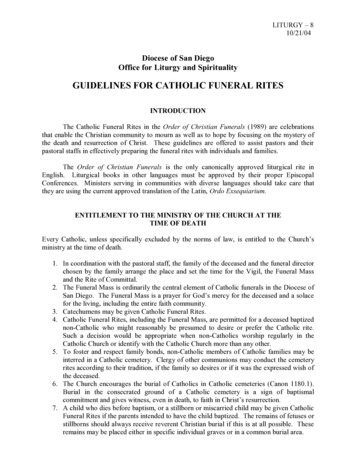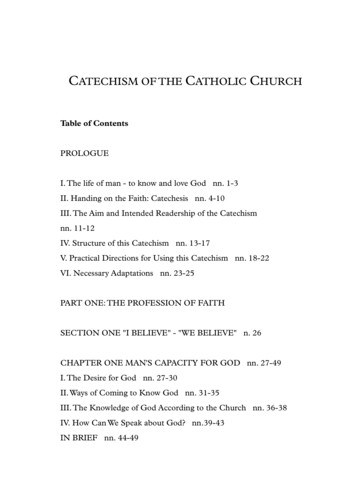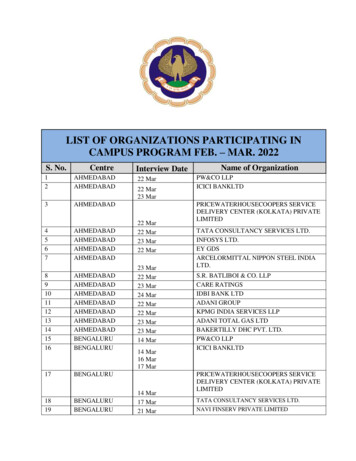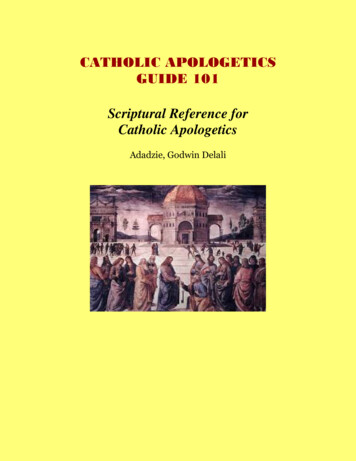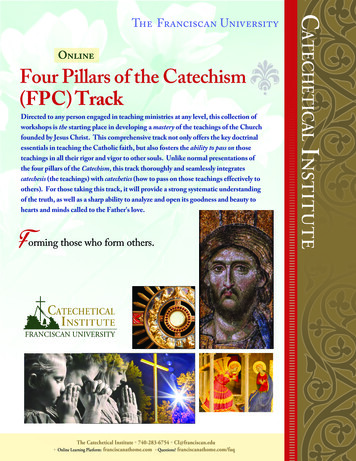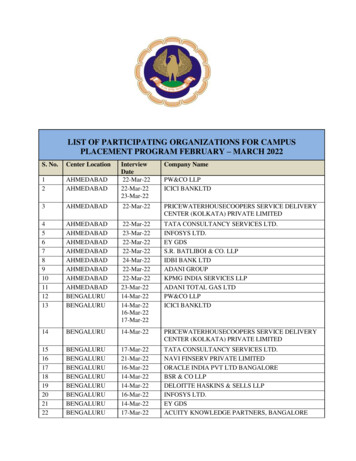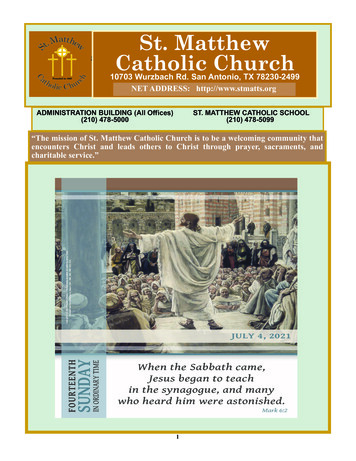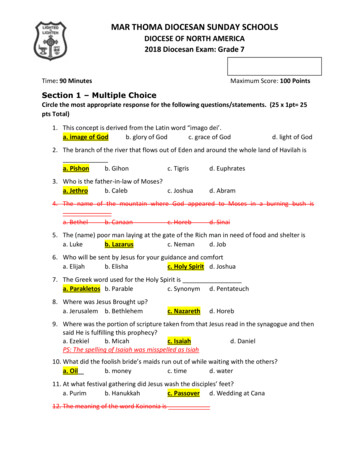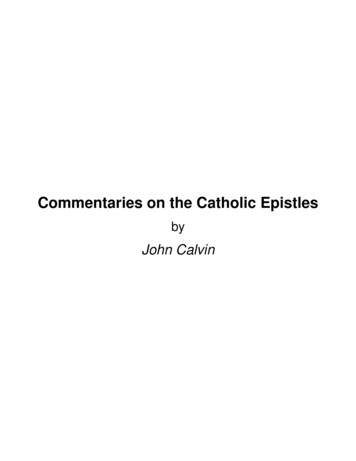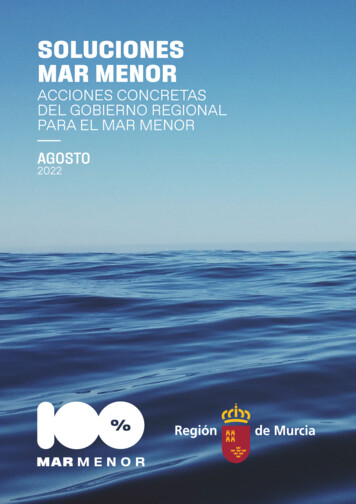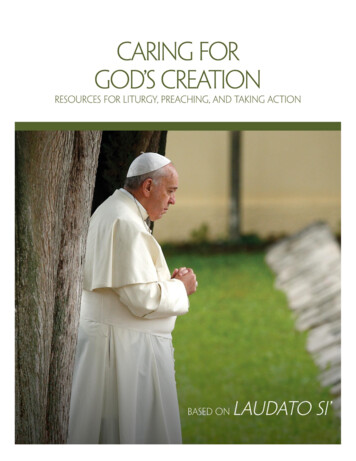
Transcription
Updated Mar. 2020Introduction:As Catholics, we have a rich heritage of faith, tradition, and social teaching to draw uponas we seek to live the Gospel faithfully in our own time and situation. As a community offaith, we seek to protect the life and dignity of every person, to care for those who arevulnerable, and to preserve our common home for our children and for future generations.In parishes, dioceses and other Catholic organizations, we encourage efforts to bringabout discussion on issues affecting the environment (climate change, consumption,pollution, stewardship of the land) that is civil and constructive, that invokes the virtue ofprudence in seeking solutions, and that is more responsive to the needs of the poor, bothhere in the United States and abroad. As Catholics, we have a unique opportunity andresponsibility to make a difference in addressing the impacts these issues present,particularly on those least able to endure the burdens.Table of Contents:What You Can Do TodayLiturgical Aids: Scripture, Prayer and Song for the Parish and HomePreaching Environmental JusticeEnvironmental QuotesCopyright 2020, United States Conference of Catholic Bishops. All rights reserved. This text may be reproduced inwhole or in part without alteration for nonprofit educational use, provided such reprints are not sold and include thisnotice.Scripture excerpts from the New American Bible, revised edition copyright 2010, 1991, 1986, 1970 by the Confraternityof Christian Doctrine, Inc., Washington, D.C. Used with permission. All rights reserved. No part of the New American Biblemay be reproduced by any means without permission in writing from the copyright holder.Excerpts from the Catechism of the Catholic Church, second edition, copyright 2000, Libreria Editrice Vaticana-UnitedStates Conference of Catholic Bishops, Washington, D.C. Used with permission. All rights reserved.Excerpts from the Compendium of the Social Doctrine of the Church 2004 Libreria Editrice Vaticana, Vatican City. Usedwith permission. All rights reserved.Excerpts from U.S. Bishops documents, Copyright United States Conference of Catholic Bishops. All rights reserved.All quotes from Popes and Vatican sources, copyright Libreria Editrice Vaticana (LEV), Vatican City. Used withpermission. All rights reserved.1
Updated Mar. 2020What You Can Do TodayLEARN OUR CATHOLIC TRADITIONHere are some helpful learning resources on the call to care for our common home: Pope Francis’ encyclical, Laudato Si’ [On Care for Our Common Home] and thisaccompanying discussion guide and handout. Pope Francis’ post-synodal apostolic exhortation, Querida Amazonia [BelovedAmazonia] and accompanying study guide. The United States Conference of Catholic Bishops' (USCCB) statement, GlobalClimate Change: A Plea for Dialogue, Prudence, and the Common Good is aparticularly useful document for discussion groups. The USCCB's Environmental Justice Program Web site: www.usccb.org/environmentTAKING ACTIONQuestions for consideration:(Taken from Renewing the Earth: An Invitation to Reflection and Action on Environment inLight of Catholic Social Teaching, 1991)For Catholics How are we called to care for God’s creation? How may we apply our social teaching with its emphasis on the life and dignity ofthe human person, to the challenge of protecting the earth, our common home? What can we in the Catholic community offer to the environmental movement, andwhat can we learn from it? How can we encourage a serious dialogue in the Catholic community—in ourparishes, schools, colleges, universities and other settings—on the significant ethicaldimensions of the environmental crisis?For People of Good Will across the Country: How do we proceed to frame a common and workable environmental ethic? What steps can we take to devise a sustainable and just economy? What can we do to more firmly link in the public mind the commitment to justiceand duties to the environment? How can we recognize and confront the possible conflicts between environmentalcare and the economy, and work for the common good to find solutions that valueboth people and the earth? How do we secure protection for all God’s creatures, including those who live inpoverty and the unborn?2
Updated Mar. 2020 How can the United States, as a nation, act responsibly about this ever more globalproblem?In working for a sustainable global economy, how do we fulfill our obligations injustice to those who are poor in developing nations?TAKING ACTION IN MY STATE1. Encourage lawmakers to improve and update public transportation options. Wheneffective and far-reaching public transportation systems are in place, fewer cars clog theroads to emit greenhouse gases and air-polluting contaminants.2. Join local efforts of groups working with elected officials and community leaders toexplore ways your local community can do business and reduce harmful emissions.3. Organize or participate in local and state Earth Day celebrations, and in Laudato Si’Week (May 16-24) to raise awareness of the challenges of climate change.4. Pay attention to legislation going before the state legislature that concern climate,emissions, or energy policies. Urge legislators to remember that people who live in povertyin your state may suffer the most from climate change and that legislative measuresshould include provisions that address disproportionate economic impacts, e.g., in heatingand transportation costs.TAKING ACTION NATIONALLYThe United States Conference of Catholic Bishops is urging that any legislative action onclimate change include provisions that (a) ease the burden on low-income communitiesand those who live in poverty; (b) offer relief for workers who may be displaced because ofclimate change policies; and (c) promote the development and use of alternate renewableand clean-energy resources, including the transfer of such technologies and also technicalassistance that may be appropriate and helpful to developing countries in meeting thechallenges of climate change. Write to your senators and representatives in Congress. Letthem know that you care about climate change and support action on a national level thatincludes the three key priorities above. For background information on the issue, go towww.usccb.org/environment and the Catholic Climate Covenant website athttp://catholicclimatecovenant.org.All across our country, Catholics are taking the St. Francis Pledge to Care for Creation andthe Poor and joining the Catholic Climate Covenant. The St. Francis Pledge is a promiseand a commitment by Catholic individuals, families, parishes, organizations and institutionsto live our faith by protecting God’s Creation and advocating on behalf of people in3
Updated Mar. 2020poverty who face the harshest impacts of global climate change. To join the Covenant, youcommit to act on each of the five elements of the St. Francis Pledge.THE SAINT FRANCIS PLEDGEI/We Pledge to: PRAY and reflect on the duty to care for God’s Creation and protect the poor andvulnerable.LEARN about and educate others on the causes and moral dimensions of climatechange.ASSESS how we-as individuals and in our families, parishes and other affiliationscontribute to climate change by our own energy use, consumption, waste, etc.ACT to change our choices and behaviors to reduce the ways we contribute toclimate change.ADVOCATE for Catholic principles and priorities in climate change discussions anddecisions, especially as they impact those who are poor and vulnerable.4
Updated Mar. 2020Liturgical Aids: Scripture, Prayer and Song for the Parish and HomePRAYERS OF PRAISE AND THANKSGIVING FROM SCRIPTUREGn 1:1-28Gn 9:8-17Ps 8Ps 65Ps 104Ps 146Ps 147Ps 148Dn 3:52-90Jn 1: 1-5Rev 21:14Creation StoryGod's Covenant with Noah and All CreationThe Majesty of GodThanksgiving for God's BlessingsPraise of God the CreatorTrust in God AloneZion's Grateful Praise to Her Bountiful LordHymn of All Creation to the Almighty CreatorPraise of God; Praise of God's CreationIn the Beginning Was the WordNew Heavens and New EarthSPECIAL OCCASIONS FOR PRAYERRogation Days: Traditionally the three days before the Solemnity of the AscensionSeason of Creation: September 1 to October 4Memorial of St. Francis of Assisi: October 4World Food Day: Week of October 16Fast for World Harvest: Thursday before ThanksgivingWorld Day of Peace: January 1Earth Day: April 22Laudato Si’ Week: May 16-24, 2020World Environment Day: Early JuneArbor Day: Varies by stateSCRIPTURE READINGSOld TestamentGn 1; 2:4-7 God's Wonderful Creation Is GoodGn 2:15God Instructed Us to Tend CreationGn 9:8-17God's Covenant with Noah and All CreationLv 25:23-24 The Land Is God'sPs 8The Majesty of GodPs 65Thanksgiving for God’s BlessingsPs 104Praise of God the CreatorPs 146Trust in God Alone5
Updated Mar. 2020Ps 147Ps 148Zion’s Grateful Praise to Her Bountiful LordHymn of All Creation to the Almighty CreatorNew TestamentMt 6:25-34 Learning to Trust in God as Does NatureJn 1:1-5Through Him All Things Came into BeingRom 8:18-25 From the Beginning until Now, the Entire Creation Has Been Groaning inOne Great Act of Waiting for RedemptionCol 1:15-23 In Christ All Things Have Their BeingRev 21:1-5Promise of the New CreationAPPROPRIATE MASSES FOR VARIOUS NEEDS AND OCCASIONS IN THE ROMAN MISSAL25. At the Beginning of the Civil Year26. For the Sanctification of Human Labor27. At Seedtime28. After the Harvest30. For the Preservation of Peace and Justice33. In Time of Famine or for Those Suffering Hunger36. For Fine Weather49. For Giving Thanks to GodConsult the Lectionary for Mass for the various Scripture readings assigned to theseMasses.PRAYERS OF THE FAITHFULThat we may receive the grace to respect and care for God’s creation, let us pray to theLord.Lord, hear our prayer.That all creatures may be blessed as a sign of God’s wondrous love, let us pray to the Lord.Lord, hear our prayer.That we may work to end the suffering of those in poverty and bring healing to all ofGod’s creation, let us pray to the Lord.Lord, hear our prayer.6
Updated Mar. 2020That we may use our technological inventiveness to undo the damage we have done toGod’s creation and to sustain God’s gift of nature, let us pray to the Lord.Lord, hear our prayer.ST. FRANCIS’S CANTICLE OF THE SUNO most High, almighty, good Lord God,to you belong praise, glory, honor, and all blessing!Praised be my Lord God with all creatures;and especially our brother the sun,which brings us the day, and the light;fair is he, and shining with a very great splendor:O Lord, he signifies you to us!Praised be my Lord for our sister the moon,and for the stars,which God has set clear and lovely in heaven.Praised be my Lord for our brother the wind,and for air and cloud, calms and all weather,by which you uphold in life all creatures.Praised be my Lord for our sister water,which is very serviceable to us,and humble, and precious, and clean.Praised be my Lord for brother fire,through which you give us light in the darkness:and he is bright, and pleasant, and very mighty,and strong.Praised be my Lord for our mother the Earth,which sustains us and keeps us,and yields diverse fruits,and flowers of many colors, and grass.Praised be my Lord for all those who pardonone another for God's love's sake,7
Updated Mar. 2020and who endure weakness and tribulation;blessed are they who peaceably shall endure,for you, 0 most High, shall give them a crown!Praised be my Lord for our sister,the death of the body,from which no one escapes.Woe to him who dies in mortal sin!Blessed are they who are found walkingby your most holy will,for the second death shall have nopower to do them harm.Praise you, and bless you the Lord,and give thanks to God, and serve Godwith great humility.(St. Francis of Assisi, 1182-1226)BLESSINGS FOR SPECIAL OCCASIONS FROM THE BOOK OF BLESSINGSOrder for the Blessing of AnimalsOrder for the Blessing of Fields and FlocksOrder for the Blessing of Seeds at Planting TimeOrder for the Blessing on the Occasion of Thanksgiving for the HarvestHYMNSAll Creatures of Our God and KingAll Things Bright and BeautifulCome Rejoice Before Your MakerEarth and All StarsFor the Beauty of the EarthFor the Fruits of This CreationFor the Healing of the NationsGod We Praise YouGod Whose Farm Is All CreationGod Who Stretched the Spangled HeavensGreat God Our Source and Lord of SpaceHis Voice Is the Thunder and the StormHow Marvelous God's Greatness8
Updated Mar. 2020Joyful, Joyful We Adore TheeLet All the Earth Their Voices RaiseLet All Things Now LivingLet the Heavens Be GladLet the Whole Creation CryMany and Great, O God, Are Your WorksMorning Has BrokenO God Beyond All PraisingOver the Chaos of the Empty WatersPraise the Lord, Ye HeavensSing to the Lord of HarvestSing Out, Earth and SkiesThe Works of the Lord Are Created in WisdomThis Is My Father’s WorldWe Plow the Fields and Scatter9
Updated Mar. 2020Preaching Environmental Justice: Suggestions for HomilistsRight will dwell in the desert and justice abide in the orchard. (Is 32:16)Homilists should not have to strain to preach environmental justice. It demands no greatleap to move from the Scriptures to today's environmental concerns. The Lectionaryalready offers great variety for the homilist to address contemporary environmental issuesout of our Catholic tradition.DRAW FROM THE LECTIONARY AND LITURGICAL CYCLEOur sacred texts are frequently quite attuned to themes of God's creation. Scripture speaksdirectly to us about creation. Rivers clap their hands, deserts bloom, and God clothes thefields of flowers. New Testament stories of stewardship, vineyard cultivation, andshepherding, not to mention parables taken from nature such as the mustard seed or thewheat that grows during the night, are easy lead-ins to preaching environmental justice.The liturgical cycle likewise offers a variety of motifs from the darkness-to-light themes ofAdvent to the death-and-rebirth themes of Easter, which can open up reflections on thenatural world and its place in the economy of redemption. The calendar of the saints andseveral of the "Masses for Various Needs and Occasions" found in the Roman Missal alsooffer occasions to deepen a congregation's sense of humanity's ties to the natural world inGod's one creation.The Memorial of St. Francis of Assisi (the Church's patron of ecology), for example, offers aunique opportunity to reflect on how his widened heart grew from love for those who arepoor to embrace all God's people. Among the Scripture selections for the Mass for thePreservation of Peace and Justice, Isaiah 32:15-18 points to the bond between justice andthe earth's flourishing.START WITH WHAT YOU KNOW (OR CAN EASILY LEARN)First, a homilist has to set aside the unfounded fear that preaching about environmentaljustice strains Scripture or is out of keeping with liturgical themes. There may still be anunspoken fear that one must become an expert on many technical problems. To be sure,an educated person's knowledge of environmental issues is helpful; but there is much onecan usefully say without pretending to be an ecologist or an expert in environmentalpolicy.A homilist can simply draw a congregation's attention to the immediate world aroundthem: beautiful sunrises and sunsets, the life-giving nature of water, the beauty of clouds10
Updated Mar. 2020and mountains, but also the smog in the valley, toxic dumps in low-incomeneighborhoods, strip mining in the local hills, or the sheer volume of a city's garbage.Without reaching beyond their own ministerial training, homilists can make links for thecongregation with what the wider Church has been saying about environment as a moralissue. A good place to start might be our own United States Conference of CatholicBishops' pastoral statement, Renewing the Earth: An Invitation to Reflection and Action onEnvironment in Light of Catholic Social Teaching.The 1991 pastoral statement sketches several distinct themes that may be of use toCatholic homilists. These include the following: (1) a sacramental view of the universe, (2)respect for human life, (3) the global common good, (4) an ethics of solidarity, (5) theuniversal purpose of created things, (6) an option for those who are poor, and (7) an idealof authentic development of the human person. Homilists can also draw from GlobalClimate Change: A Plea for Dialogue, Prudence and the Common Good, the U.S. Catholicbishops’ 2001 pastoral statement, as well as chapter ten of the Compendium of the SocialDoctrine of the Church, on safeguarding the environment (see below) and Pope Francis’encyclical, Laudato Si’ [On Care for Our Common Home] and post-synodal apostolicexhortation, Querida Amazonia [Beloved Amazon]. The major themes of Laudato Si’ aresummarized on this handout.Homilists can also do a service to the universal Church by acquainting parishioners withthe environmental concerns of the local Church in other parts of the world. Bishops’conferences from around the world have made wonderful statements about environmentaljustice and climate change, and many of these statement are lifted up in Laudato Si’Still another aspect of preaching in this area is the introduction of broader themes ofspirituality. Today’s congregations are hungry for spirituality, and many people findspiritual solace in nature. Leading people from their native delight in nature to “the Lovethat moves the stars” can begin to heal hearts that feel divided between care for creationand love for the Creator. Reflection on the humility of Christ or of St. Francis, to takeanother example, can be an occasion to insert a forgotten but much-needed Christianvirtue into the making of a Christian ecological consciousness.MAKE IT MAINLINEIn today’s busy world, people are grateful for a message that helps them to integrate theirotherwise fragmented lives. Indeed, for many that is the immediate religious appeal of carefor creation. Environmental justice cannot be just another “to do” item to be added to along list of unfulfilled wishes. Environmental justice will enter the hearts and minds ofpeople only when it helps them integrate their lives.11
Updated Mar. 2020The more that environmental justice is linked to our reading of the Scriptures, to ourworship, to our spirituality, the more it is integrated into the whole of our life as a believingcommunity – then the more it can be a source of renewal for ourselves and for all creation.Care for creation is a constant theme in the Scriptures, in both the Old and NewTestament. Environmental justice is thoroughly embedded in the Church's social teaching,and it has been a repeated theme of Church teaching. See the Compendium of the SocialDoctrine of the Church1, particularly chapters four and ten (excerpts below are from thesechapters).The demands of the common good are dependent on the social conditions of eachhistorical period and are strictly connected to respect for and the integralpromotion of the person and his fundamental rights. These demands concern aboveall the commitment to peace, the organization of the State's powers, a sound juridicalsystem, the protection of the environment, and the provision of essential services toall, some of which are at the same time human rights. . Nor must one forget thecontribution that every nation is required in duty to make towards a true worldwidecooperation for the common good of the whole of humanity and for futuregenerations also. (no. 166)Care for the environment represents a challenge for all of humanity. It is a matter ofa common and universal duty, that of respecting a common good, destined for all,by preventing anyone from using "with impunity the different categories of beings,whether living or inanimate animals, plants, the natural elements-simply as onewishes, according to one's own economic needs." It is a responsibility that mustmature on the basis of the global dimension of the present ecological crisis and theconsequent necessity to meet it on a worldwide level, since all beings areinterdependent in the universal order established by the Creator: "One must take intoaccount the nature of each being and of its mutual connection in an ordered system,which is precisely the 'cosmos.'" (no. 466, citing Sollicitudo Rei Socialis, no. 34)Responsibility for the environment, the common heritage of mankind, extends notonly to present needs but also to those of the future. "We have inherited from pastgenerations, and we have benefited from the work of our contemporaries: for thisreason we have obligations towards all, and we cannot refuse to interest ourselves inthose who will come after us, to enlarge the human family." This is a responsibilitythat present generations have towards the future, a responsibility that also concerns1Pontifical Council for Justice and Peace, Compendium of the Social Doctrine of the Church (Washington, DC: USCCB,2004).12
Updated Mar. 2020individual States and the international community. (no. 467, citing PopulorumProgressio, no. 17)Large, varied congregations, like many of our Catholic parishes in the United States, arebest served by integrating preaching on creation into the ordinary worship life of theparish and the living tradition of the Church. This includes Catholic social teaching.Preaching is a place for basic information and application to the life of the faithful. Thecommunity will respond positively to a simple homily that shows prayerful appreciation forthe goodness of creation or the responsibilities of stewardship of the earth.HOMILY NOTES FOR SELECTED SPECIAL OCCASIONSRogation DaysBackground: Rogation Days were customarily held during the three days preceding theFeast of the Ascension, in which prayers, fasting and abstinence were observed inpreparation for the celebration of the Ascension of the Lord. Farmers would often havetheir fields blessed for a bountiful harvest. While the observance of these days aregenerally no longer required, they are still marked in some places. When the LiturgicalCalendar permits it, this period could be a good time for a special celebration on thetheme of environmental justice, drawing from the Masses or other sources mentioned inthe previous section. The Rogation Days involved prayers for the harvest, expressions ofcontrition and Eucharistic processions with Benediction in the fields, and this penancepetition structure is easily adapted to contemporary prayer services focused onenvironmental justice.Homily Suggestions: Many of the readings assigned for these Masses speak of thegoodness of God in creation. A central theme here might be the solidarity of the humanfamily by virtue of creation and the duty of solidarity with those in need. (See Pope JohnPaul II's On Social Concern and the United States Conference of Catholic Bishops'statement Renewing the Earth on solidarity.) God's generosity in creation ought to serve asa model and warrant for our generosity toward the poor in their struggles for a good lifein a healthy environment.Memorial of St. Francis of Assisi (October 4)Background: This Memorial concludes the Season of Creation, celebrated each year onSeptember 1 to October 4. By both official designation of Pope John Paul II and popularusage, St. Francis of Assisi is patron of care for God’s creation. While Francis tamed wolves,preached to birds, and wrote the Canticle of the Sun, he was above all a friend of the poor.Indeed, ecology-minded Franciscans argue that it was his struggle to love persons in13
Updated Mar. 2020poverty perfectly that gave rise to the humility in which he became a brother to allcreation. For that reason, the Memorial of St. Francis of Assisi is an especially good time toaddress questions of environmental justice, particularly environmental racism andenvironmental injury to the poor.Homily Suggestions: St. Francis was so devoted to the literal imitation of Christ that hereceived the stigmata, the wounds of Christ in his own flesh. In Francis's case, however,this special grace was the fruit of a life given to the imitation of Christ in humility andpoverty and to the service of those who are poor and marginalized in society. TheMemorial of St. Francis of Assisi, therefore, is an appropriate time to make the case that anoption for those who are poor stands at the heart of Christian environmentalism.Among the choices for Gospel readings in the Lectionary’s Common of Holy Men andWomen is the beginning of Matthew 5: the Beatitudes, a thumbnail version of the Gospelas addressed to those who are poor and dispossessed. Each of the sayings is addressed toan audience that Francis, like Jesus, might have encouraged. Especially worth noting is"Blessed are the meek, for they will inherit the land." This text offers opportunity to reflecton the dispossession of those who are poor from their land in many parts of the world, aphenomenon that contributes to environmental degradation and swelling refugee flows. Italso suggests an opportunity to explain the Church's teaching on "the common purpose ofcreated things" – a cornerstone of Church teaching on economic life, and a doctrine thatdemands equitable sharing of the earth's resources by all people.OTHER HOMILY IDEASSpecial occasions like Laudato Si’ Week, the Rogation Days, the Season of Creation, or theMemorial of St. Francis of Assisi are potential times to preach about environmental justice.However, it is also helpful to integrate environmental themes throughout the liturgical yearas Scripture and the Lectionary suggest. Caring for God's creation is an ongoing mission, notjust another subject for special observance.Creating an Environment with Our GodGood homilists identify with their audience and become a "we" through their delivery andmessage. They are instrumental in creating an awareness of the sacredness of themoment, of the "here" and "now" – a time to encounter God. Homilies differ in winter andsummer, morning and evening, rural and urban settings. To be aware of people, place, andtime is the most elementary form of environmental consciousness. Some suggestions mayhelp deepen this experience:14
Updated Mar. 2020 Community EnterpriseThe homilist does not have to be an expert on ecology. The homilist shares with all thevocation of healing a wounded earth. Preaching pulls in the experience of the community,and the homilist should reflect or mirror that experience. Respect for All CreaturesWhenever speaking of human beings, the crown of creation, and plants, animals, and all ofnature, do so with the deepest respect. We are all creatures of God and must learn to livein harmony and peace. This sense of respect expresses the dynamic interrelationship thatall creatures share with each other. Handling ControversiesCertain environmental concerns can divide a congregation. It is best for the homilist toaddress a problem through a series of questions rather than suggesting a resolution. Forexample, connecting our faith tradition (Scripture and teaching) to an issue by asking howthe tradition might impact or inform an issue is one way to begin. Good preaching allowsparishioners to share their thoughts in light of our faith and Catholic teachings. GratitudeThe homily should express thankfulness for the rich gifts of God's creation. Our awarenessof the mystery and beauty of the web of life must be expressed in a variety of ways.Homilist and people together become more aware of God's gifts of creation and togetherask for forgiveness for the acts of environmental destructiveness and misuse of resources.MAKING HOLY PLACE AND TIME WITH CHRIST, OUR REDEEMERTry frequently to begin your homilies with examples from the world of nature. Theseexamples serve as a setting or composition of time and place, a special flavor for thereligious theme to follow. Our liturgical prayer life is already rich with direct references toGod's creation, and the liturgical calendar reflects the seasons.This practice of environmental awareness by the homilist highlights not only nature's gifts,but also the propensity of human beings to misuse God's gift of creation in our everydaylives. Select vivid examples of God's goodness and human misdeeds or healing based onthe parish's location/climate and the homilist's creative imagination. Suggestions for sometimes and places follow. JanuaryCreeks, rivers, and other forms of moving water, including ice, manifest the flow of lifeitself. A gurgling stream or rushing river, even in midwinter's rest, is the sign that new life is15
Updated Mar. 2020coming forth, even when it is not yet perceptible in a snow-covered landscape. Our life inChrist begins through the saving water of Baptism; since this is so, we have an obligationto protect and save the water. Water pollution is widespread, denying safe drinking waterto millions of people. FebruarySoil under our feet goes unnoticed, though this first foot of soil is where most livingorganisms dwell. The health of the fragile skin of our earth is of utmost importance.Humility comes from the Latin word for soil, "humus." From and unto dust is the humblingmessage to each of us touched by the dust of Ash Wednesday. Soil is rich and fertile butalso prone to erosion and pollution. MarchThe winds of March point to the power of God's Spirit working in us. We need to listen andrespond to the gentle breezes of the Spirit; but will we, or will we be too distracted? Therebirth of spring reminds us of the energy of nature so that we ask ourselves whether wewaste or wisely use energy – electricity, oil, gas, etc. Can we and should we continue to usenonrenewable fossil fuels, often with accompanying air pollution, at the rate we do? Or willthe environmental ills we cause today call us in the future as a society to use wind andsolar energy? AprilLush and blooming vistas beckon us to take to the road and to explore. As we itch to goout and travel more in springtime, let us reflect on the mixed blessings. Interconnectedcommunities and beautifu
Here are some helpful learning resources on the call to care for our common home: Pope Francis' encyclical, Laudato Si' [On Care for Our Common Home] and this accompanying discussion guide and handout. Pope Francis' post-synodal apostolic exhortation, Querida Amazonia [Beloved Amazonia] and accompanying study guide.
